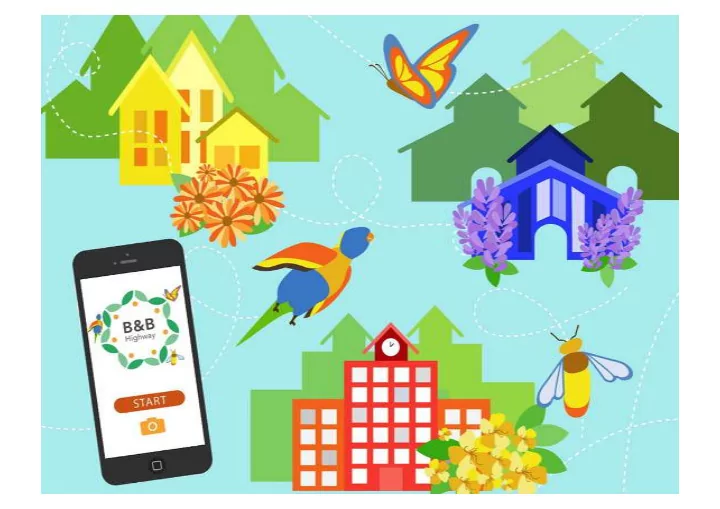

THE B&B HIGHWAY B & B stands for ‘Bed & Breakfasts for Bees, Birds, ● Butterflies & Biodiversity’ Located at strategic intervals across the urban ● landscape for rest & respite Each B & B features: a pollinating garden & stingless ● native beehive and/or an insect hotel Five LGA’s have so far provided funding for a series ● of B & Bs. More planned in 2019/20 Existing initiatives overseas such as in Oslo, Belfast & ● Vancouver seeing incredible results The B & B Highway is co-ordinated and run by the ● not-for-profit FoodFaith with input from a number of Australian universities. Founder Judy Friedlander works with the Institute for Sustainable Futures at UTS and has this year submitted her PhD. See SMH and UTS articles: https://www.smh.com.au/national/nsw/b-and-bs-for-bees-the-bid-to-save-sydney-s- pollinators-20190213-p50xfk.html https://www.uts.edu.au/news/social-justice-sustainability/bb-highway
OUR BIODIVERSITY IN DECLINE ! ● The B & B Highway initiative responds to alarming research from the UN and peer-reviewed academic journal reports ● More than ½ million species on land ‘have insufficient habitat for long-term survival’ ● Bee decline around the world ● 40% of insect species are threatened with extinction ( Worldwide decline of the entomofauna: A review of its drivers; Biological Conservation April 2019) ● 2.5% decline of current insect biomass which, if continues, extrapolates to total disappearance of insects within 40 years ● Scientific evidence of reduced insect populations is supported by anecdotal reports such as ‘Windshield effects’ i.e. fewer insects hitting cars’ windshields - a noticeable decline in insect numbers ● Research states that habitat loss is the main driver of insect declines (followed by pesticides/fungicides; predators and climate change). The varroa mite is an issue for honey bees, causing colony breakdown around the world. (Australia is currently the only continent to be free of this parasite, however, there are concerns). OUR ANSWER: THE B&B HIGHWAY SYDNEY
WHY WE NEED POLLINATORS ● Insects are the basis of ecosystems and the food chain with research indicating the importance of native insects such as native stingless bees for pollination ● A third of the food we consume is directly connected to pollinators ● Insects purify water and recycle our soil ● Animal pollination directly affects the yield and/or quality of 75% of globally important crop types (From Nature 2016) ● Bees are the most important group of pollinators for our food, visiting more than 90% of the leading 107 global crop types
HOW URBAN AREAS ARE KEY ● Research indicates cities hold the key to reversing bee decline – implications for other insects (recent study published in Nature Ecology and Evolution ) ● Cities can become biodiversity hotspots featuring a range of pollinating plants ● We need to make cities into sanctuaries for pollinators and people ● A simple solution - instead of concrete, grasses and non-flowering plants and trees, we can plant pollinating plants ● We need to be strategic about what we plant
PLANTS FOR POLLINATORS
ABCs OF THE B&Bs Current locations of the ‘airborne roads’ of the ● B & B Highway: Wentworth, Lane Cove, Blacktown, Liverpool and Randwick: Interest from Ryde, Willoughby & northern beaches Schools and community centres ideal hosts ● due to engagement with students, residents and workers Plants selected by horticulturists ● Melioponist and beekeeper advisers and ● expertise Collaboration with universities ●
NATIVE STINGLESS BEES • Native stingless bees produce 'sugarbag' - similar to honey but thinner and more ‘lemony’ • Because the native stingless bees are smaller than European honeybees and cannot fly as far, they do not produce as much 'honey' • Designers for the B&B Highway need to understand implications of biology, impacts of cold and heat and how the bees reproduce and make sugarbag • Hive designs consider insulation, materials (polystyrene, timber - different thicknesses, types of timber), optimum locations and which way they face, etc. • Dr Tim Heard’s website www.sugarbagbees.net and book The Australian Native Bee Book are excellent resources
OUR CITIZEN SCIENCE PROJECT • Citizen Science links engaged citizens, students and university researchers • Successful examples include initiatives such as FrogID, iNaturalist and Wild Pollinator Count • FoodFaith’s vision is to enable citizen scientists to identify insects and birds with a mobile app/ optimised website to help build a living atlas of pollinator research, linked into the Australian Living Atlas • School-led citizen science activities can help biodiversity research: Examples - What do our native bees eat? What is pollinating our endangered Eastern banksia scrub? What pollinators are in each area? • In discussions: Department of Education, City of Sydney, the Australian Museum
Making Sydney a sanctuary for people and pollinators Join us via FoodFaith to keep up to date on the B&Bs’ progress www.foodfaith.com.au @foodfaithau
Recommend
More recommend